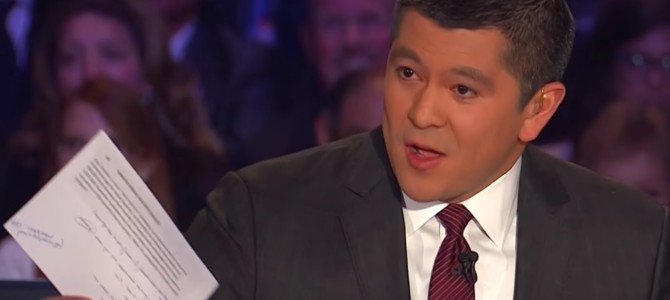
Over the years, I’ve probably written hundreds of pieces grumbling about the mainstream media’s liberal bias, which is real, widespread, and often corrupt. But if media organizations—and this includes conservative outfits, as well—allow politicians to micromanage debates in the way Republicans are now discussing, they won’t be making these events any less biased, only less informative and entertaining.
For starters, the slew of limitations proposed in the letter reportedly drafted by GOP attorney Ben Ginsberg have absolutely nothing to do with the bias of mainstream media moderators and everything to do with attempts to transform GOP debates into infomercials.
Why can’t a network film candidates looking at their notes? And why can’t they show shots of the audience? What does leaving the mic open have to do with dumb questions? Why does the GOP care if there are candidate-to-candidate questions asked during a candidates’ debate? None of these restrictions help with the fundamental problem of Harwood-style gotcha advocacy posing as journalism. A raucous argument with genuine questions and disagreements is somewhat useful and watchable (the first Fox debate featured all of these things).
It looks like the revolt is already crumbling. But in Politico, you can read some of the Republicans’ concerns. The focus is all wrong. Jeb Bush’s camp, for instance, is actually arguing for veto power over chyrons:
At one point in the meeting, representatives for Bush demanded that campaigns have veto power over which graphics the networks are allowed to use. (During the last debate, CNBC listed Bush’s past work as a financial consultant but omitting his eight-year tenure as Florida governor.) Aides to other candidates agreed.
Like the rest of the CNBC debacle, trying to frame Jeb! as a banker rather than life-long politician is preposterous. But what kind of journalist would agree to that kind of oversight from a candidate? Will all journalists, even the honest ones, have to negotiate with Republican campaigns over every graphic and picture they use during a telecast?
The other day, Ben Carson argued that he wanted to see longer and more “substantial” opening and closing statements, which are surely the least enlightening part of any political debate. Other than Donald Trump, Carson probably offers the least substantive answers to policy questions, anyway. Voters would be better served by hearing them answer bad questions than hearing another stump speech. There is scant evidence that offering candidates more uninterrupted time will prod them into offering more specificity about their positions. The opposite is just as likely to happen.
So really, the Ginsberg letter only needed to offer two sentences: “We promise to sign off on better moderators next time. We apologize for our stupid mistake.”
Because there are plenty of ethical journalists out there—most of whom probably harbor ideological biases but aren’t hacks—the best thing for Republicans is to reward those kinds of people. It would be a lot more constructive than demanding networks remove all the brown M&Ms.
‘Fair’ and ‘Substantive’ Are Not Mutually Exclusive Terms
None of this means conservatives don’t have a point about the media, of course.
It was amusing watching journalists acting like this entire kerfuffle was all about the inability of Republicans to answer “tough questions” rather than decades of institutional favoritism. Or even more preposterously, that demanding to be treated with the same tenderness as Democrats meant that Republicans were undermining free speech in some way. A rallying cry from journalists could be heard across the Twitterverse, demanding someone, somewhere stand up and fight. If only these sentinels of principled reporting felt the same way every time some hackneyed hit piece rolled off the presses at The New York Times.
Demanding more favorable treatment is not tantamount to attacking the First Amendment. A candidate has no obligation to stand in front of moderators who misrepresent their position and answer useless but antagonistic questions. Not to mention, this is a primary, not a general election. Demands are nothing new. In 2007, Democrats boycotted a Fox News debate because they wanted to avoid an outlet that might pose challenging questions.
As the CNBC debate illustrated, apparatchiks like Harwood have no shame posing as unbiased moderators because they believe their gotcha questions are unadulterated “reality.” Bernie Sanders will never be asked if he’s running a ‘Leninist version of the presidency’ and Hillary will never be asked if she’s running the ‘Nixonian version of the presidency’ because the same antipathy just isn’t there for Democrats.
Now, if I were running the RNC, I would continue to bitterly criticize the CNBC debate publicly, while attempting to get something very similar on television tout de suite. No Republican was hurt in the making of that debate. And rarely have the legitimate conservative grievances regarding the media been so obviously on display.
But if you prefer moving the debates to conservative outlets, my colleague Ben Domenech’s preferred proposal—that the RNC partners with conservative organizations and then auctions off the rights to larger media organizations—makes a lot of sense. This would ensure that media gets its ad revenue, the GOP gets its debate out to the largest number of people possible, and Republican candidates answer questions that matter to constituents rather than Beltway Democrats posing as journalists.
Even then, conservative partners shouldn’t surrender to demands that further corrode the independence of those asking questions and covering the event. The more we let politicians herd journalists behind ropes and dictate the terms of interaction, the less we know. Obviously, there has to be some framework for any debate, and Republicans have every right to ask for a reasonable set of rules that assure impartiality between those participating. But the list of demands drawn up by most of the candidates is just cover for the Republican Party and bad news for voters.









